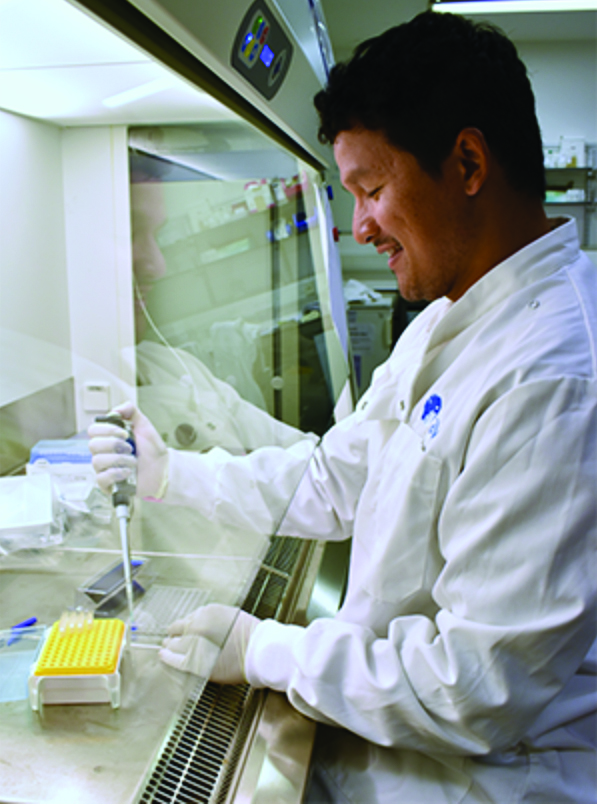September 8, 2020
IAVI Researchers Publish Study on Antibody Responses to HIV Immunogen in Non-human Primates
Findings published in Cell Reports may guide HIV vaccine developers.
 Devin Sok, Ph.D., IAVI senior director of antibody discovery and development
Devin Sok, Ph.D., IAVI senior director of antibody discovery and development
Researchers at IAVI’s Neutralizing Antibody Center (NAC), Scripps Research, and other partner organizations have identified and isolated a suite of neutralizing HIV antibodies that develop in rhesus macaques in response to immunization with BG505 SOSIP. This immunogen is the basis of several HIV vaccine candidates now in Phase I clinical trials, including the IAVI W001 trial. Their findings were published in Cell Reports on September 8, 2020.
When these antibodies do their job, they latch on to certain key spots on the BG505 virus (the particular HIV strain from which the immunogen was derived) and neutralize it.
While these antibodies effectively neutralize BG505, they might present a roadblock for vaccine developers. Many scientists agree that the goal of a globally effective HIV vaccine will be to elicit the development of broadly neutralizing antibodies – powerful antibodies capable of neutralizing a wide variety of HIV variants. The antibodies generated in this study may block access to certain key spots on HIV that are the target of many bnAbs. The researcher suggest that vaccine developers will need to take this challenge into consideration as they work on strategies for how to improve upon or use BG505 SOSIP 664 to elicit bnAbs. One approach could be to alter BG505 SOSIP so that it sidesteps elicitation of the competing antibodies. Another approach could be to try to guide antibody maturation with a series of immunogens that turn the competitive antibodies into ones with the desired broadly neutralizing capabilities.
Among the different antibodies isolated in the study, the researchers were surprised to find one family of antibodies that is shared across three animals. They postulate that this common antibody family (called a public clonotype) might be part of the reason why there’s a dominant response against a particular target on the BG505 virus. Human may have a similar public clonotype. This too could be a challenge for vaccine developers—developers may need to alter BG505 SOSIP so that it doesn’t attract the attention of the dominant antibodies. Alternatively, they may have to find a way to stimulate bnAb precursors that outcompete the antibodies associated with the public clonotype in question.
The senior author of the paper, Devin Sok, Ph.D., IAVI senior director of antibody discovery and development, said, “This study provides another dimension of understanding antibody responses against the BG505 SOSIP.664 recombinant trimer and was only possible through the collaborative contributions across different labs.”
Primary funders of the study were the U.S. National Institutes of Health, the Center for HIV/AIDS Vaccine Development, and the Bill & Melinda Gates Foundation Collaboration for AIDS Vaccine Discovery. The United States Agency for International Development supports research at the IAVI NAC.
Authors of the paper are Fangzhu Zhao, Collin Joyce, Alison Burns, Bartek Nogal, Christopher A. Cottrell, Alejandra Ramos, Trevor Biddle, Matthias Pauthner, Rebecca Nedellec, Huma Qureshi, Rosemarie Mason, Elise Landais, Bryan Briney, Andrew B. Ward, Dennis R. Burton, and Devin Sok.
Zhao, F. et al. Mapping neutralizing antibody epitope specificities to an HIV Env trimer in immunized and in infected rhesus macaques. Cell Reports. 2020 Sep 8 32;10:108122.